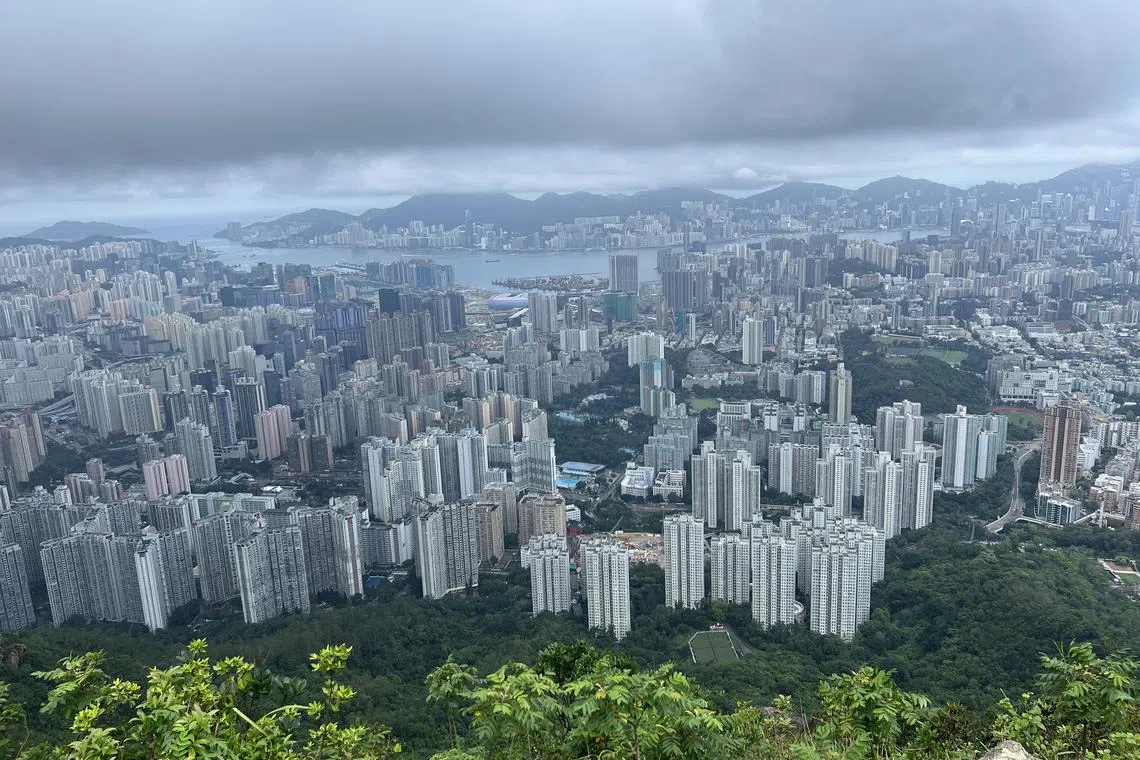News analysis
Beijing is nudging HK’s tycoons to do more for the economy. Will they heed the call?
The relationship between the central government and the city’s business elites is evolving
Sign up now: Get insights on Asia's fast-moving developments

Overall, home prices in Hong Kong have dropped by more than 25 per cent since late 2021, falling to their lowest level in eight years in September.
ST PHOTO: MAGDALENE FUNG
Follow topic:
HONG KONG – It took a nudge from Beijing to prod Hong Kong’s tycoons to action.
Hong Kong’s top property developers on Nov 29 pledged their support for the Northern Metropolis mega project to build a 30,000ha business, tech and housing hub along the city’s border with mainland China.
Potential investors had previously expressed uncertainty about the ambitious project for the lack of concrete details on how exactly the authorities planned to build up a complete ecosystem from scratch in an area the combined size of Wan Chai, Admiralty, Central and Sheung Wan, or nearly half the size of Singapore.
But they eventually acted in unison to back the mega project – the same month that Beijing’s point man on Hong Kong affairs, Mr Xia Baolong, urged Hong Kong’s real estate tycoons to “shoulder their responsibilities” and “take concrete actions” to promote the city’s economic development.
Major local developers including Henderson Land Development, Sun Hung Kai Properties and New World Development signed an agreement to support and participate in the government-led project.
The episode reflects the evolving relationship between the central government and Hong Kong’s community of business elites. Where once the city’s magnates – many of whom built their empires in the property sector – were at liberty to conduct business purely on the profit motive, they now increasingly also have to take into consideration the top-down direction from Beijing.
And more such messages should be expected as Beijing seeks to exert tighter control over Hong Kong and help to revive its flagging economy amid low investor confidence.
Ahead of Mr Xia’s call to action in early November, Chinese President Xi Jinping had in August also made the rare move of engaging with Hong Kong’s business elite. In a letter to some of the city’s magnates of Ningbo ancestry, Mr Xi exhorted them to leverage their strengths to play a bigger role in the country’s development.
Political pressure from the top?
These explicit messages from Beijing to Hong Kong’s tycoons add a fresh layer of complexity to the way the city’s entrepreneurs do business from now on, according to prominent China commentator Wang Xiangwei.
“Beijing’s intentions are good, but while this strategy of openly urging firms to invest tends to work in mainland China, it will be read differently in Hong Kong,” Mr Wang, a journalism lecturer at the Hong Kong Baptist University and former editor-in-chief of the South China Morning Post (SCMP), told The Straits Times.
“The Hong Kong tycoons and local businesses may see this kind of talk as an indirect form of political pressure, and so may have reservations about it.”
Mr Wang had in July penned a column suggesting that to boost the current lacklustre international investor enthusiasm for China, Beijing should first start by reigniting the investment interests of Hong Kong’s tycoons.
But the top-down manner in which Beijing now appears to be going about it is not quite what the veteran China watcher had envisioned.
“Under the ‘one China, two systems’ framework, what Beijing believes is the right thing to do on the mainland may not be right for Hong Kong,” he added.
Mr Bernard Chan, a Hong Kong businessman and former politician, said the central government’s messages are “rooted in common sense”.
“It is easy to overthink it, but the message is this: Embrace challenges, collaborate to seize chances to make profits and a positive impact,” Mr Chan, the grandson of Mr Chin Sophonpanich, the late tycoon founder of Thailand’s Bangkok Bank, wrote in a recent SCMP column.
When asked by ST to elaborate, he said: “Hong Kong’s business sector does need to embrace change. While we have done well in the last 20 to 30 years, we need to re-examine our business models to stay competitive and relevant.”
Mr Chan sits on the boards of several local and overseas financial services firms and heads local think-tank Our Hong Kong Foundation.
Mr Chan admitted, however, that Beijing’s top-down approach can be confusing and “result in scepticism” among Hong Kong’s business leaders, who are “more accustomed to a decentralised, market-driven environment”.
Beijing’s messages also come at a difficult time for Hong Kong’s tycoons.
They have had to weather a property slump in their home city, as well as a broader economic downturn in China
Overall, home prices in Hong Kong have dropped by more than 25 per cent since late 2021, falling to their lowest level in eight years in September.
The city’s developers have been selling new residential properties at big discounts, even at a loss, as an unsold backlog stands at a 20-year high.
In October, Sun Hung Kai sold a batch of new homes at around 38 per cent below
Another major developer, New World, has been grappling with succession turbulence after its new chief executive, Mr Eric Ma, resigned on Nov 29, just two months after the sudden removal of his predecessor Adrian Cheng, the grandson of the company’s late founder Cheng Yu Tung. Mr Adrian Cheng was reportedly removed for underperforming.
No obligations
To be sure, Hong Kong officials have clarified that the city’s business leaders are not obliged to play ball, despite Beijing’s recent calls to action.
“Of course, enterprises can make their (own) decisions,” Chief Executive John Lee told the media in November, days after Mr Xia’s speech to the tycoons sparked debate.
“But the key point is how much you love this place and how much you think you should contribute.”
Still, those leading the city’s top developers have for now fallen in line – at least for the Northern Metropolis mega project – to develop Hong Kong and the Greater Bay Area’s next economic powerhouse.
At Henderson Land, founded and run by tycoon Lee Shau Kee and his family, a spokesperson told ST that the company “stands alongside the Hong Kong government (and) is committed to utilising its resources and expertise to support the development of the Northern Metropolis”. The developer has also pledged “to support Hong Kong’s integration into the country’s overall development”, the spokesperson added.
At Sun Hung Kai, controlled by the family of late tycoon Kwok Tak Seng, a spokesperson said the company “has already played a key role in the development of the Northern Metropolis”.
It recently became “the first developer to successfully reach a land exchange agreement in Fanling North, demonstrating its strong commitment to the new blueprint for the area” and would “actively explore and participate in suitable projects in the Northern Metropolis once the details are announced”, the spokesperson told ST.
The land swop deal with the government allows Sun Hung Kai to buy and develop the land in the area while requiring it to build residential homes, malls and public facilities there, among other conditions. Fanling North is an area within the mega project’s development zone.
Real estate consultancy Colliers said Hong Kong property developers’ recent show of support reflected “their growing interest and optimism towards the mega project”.
“The government’s development plan of the pilot programme of large-scale land-disposal approach has been a key driving force in attracting the enterprise participation,” said Ms Kathy Lee, head of research at Colliers Hong Kong.
She was referring to a pilot scheme announced in October, where sizeable land parcels in the area with commercial value for public facilities would be granted to successful bidders for collective development.
To attract more investor interest, “the government could explore considering land premium at market price and minimising the public facilities required from the winning bidder to help lower construction costs”, Ms Lee added.
But whether Hong Kong’s business leaders will really put their money where their mouth is remains to be seen.
Mr Wang, the China commentator, said: “But how much they will eventually invest is still a question mark. At the end of the day, they need to ensure that their investments can rake in the profits.”


